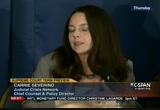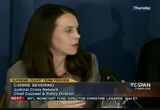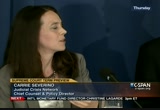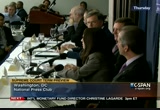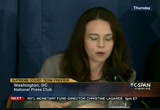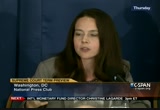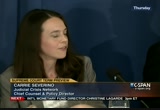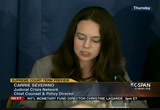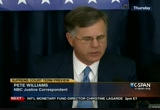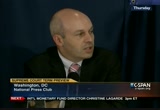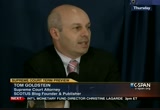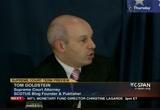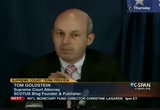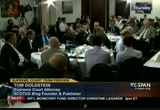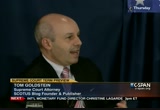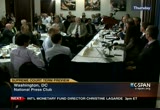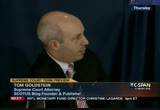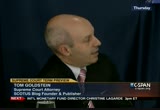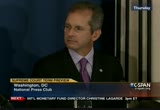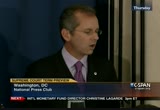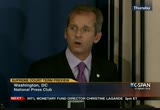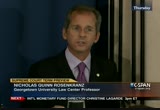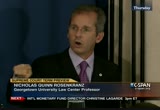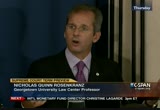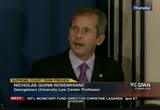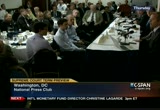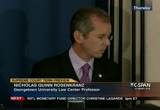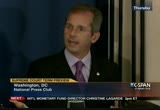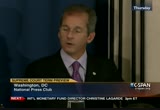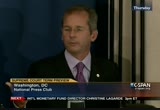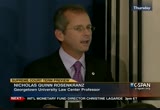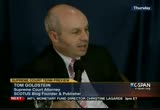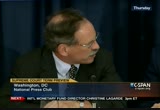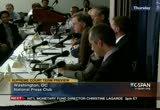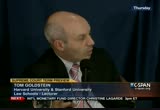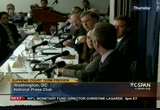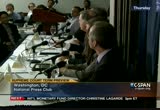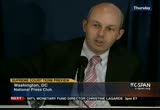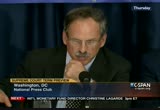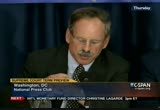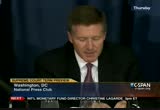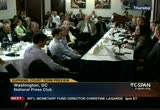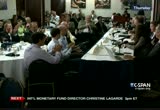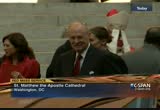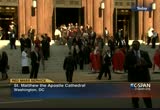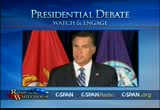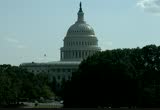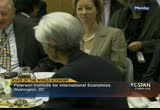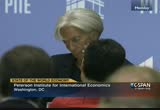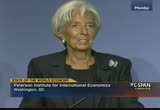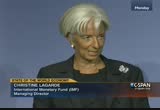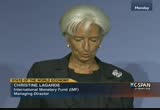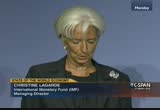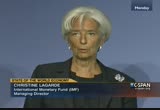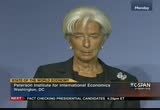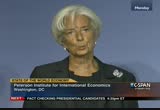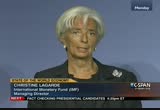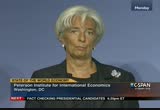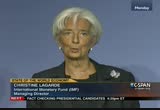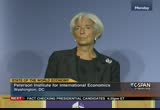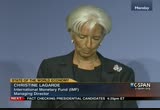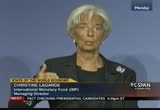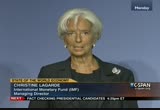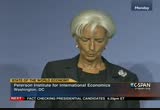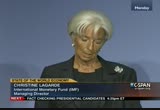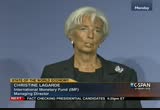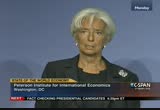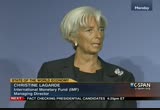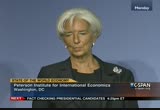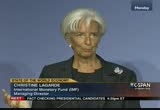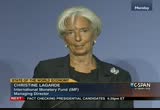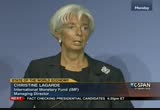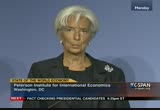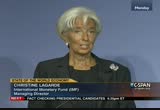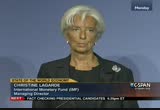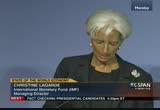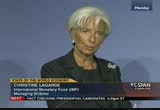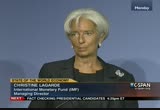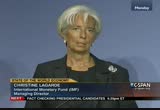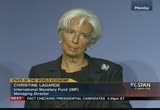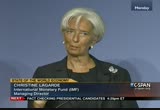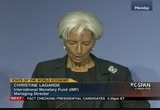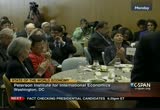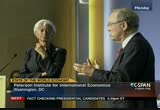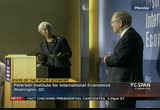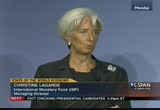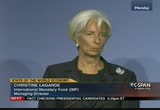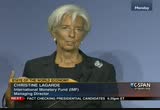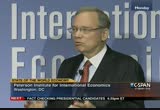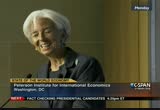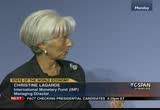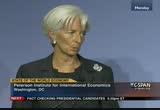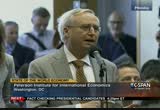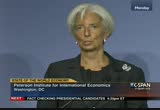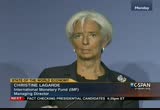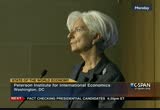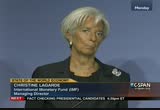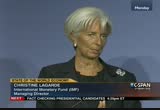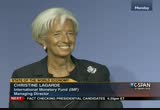tv Washington This Week CSPAN September 30, 2012 2:00pm-3:56pm EDT
2:00 pm
y broad ruling, finding same-sex marriage was mandated by the equal protection clause of the constitution. not -- their right to it same- sex marriage. you need not marry a member of the same sex but it must allow for same-sex marriage. his role is very broad point. the ninth circuit that case in came up with a much more narrow grounds. it looks to me like uniquely tailored to appeal to justice kennedy. he says we're not even going to address the basis as a matter of itself. when to have a state where there is a law that says it is on the
2:01 pm
books and you eliminate that right, and it gets this heightened scrutiny. there seems to be no reason for that except for the class of people that you are removing from this. it makes a difference. the right was there after the court found it after this whole history of the citizens having passed referendum to block it in the courts. that is not matter if it was there for a year or a day. that is not an equal protection violation. anything you can never take it a
2:02 pm
way. he says it is not a one-way ratchet. engine cannot take it away. that really only applies to the situation in california. the supreme court has not made its call. possible they will take it to shoot them down. if they approve it, and they probably would let it stands. it is such a quirky opinion that it will not have that brought up an effect. the ninth circuit is not viewed by others as a very controlling kind of precedence.
2:03 pm
there is an arguably controlling pace. it is a summary of a similar challenge to minnesota laws. the courts really gave this and did not consider it. the supreme court may be concerned that those are the main cases. i will turn to the voting rights act that has another set of cases. they have two main sections that are an interest. the first prevent voter discrimination. section 5 was designed to prevent it from having new worker runs from them explicitly
2:04 pm
listed in section two. if you are a state or a jurisdiction that requires pre clarence, you cannot change your boating rules unless we clear them ahead of time. you are a presumption that you withing wrong. it started in 1964. we were using these practices or have less than their voting population register to vote. that is because we thought these oppressed minority voter registration. these things to fix racial discrimination should not be perpetual. a racially they said there optimistic. they realize they were not babte yet. now we are there to authorizing it. we have gotten less optimistic over time.
2:05 pm
while not changing which jurisdictions are covered. it is a test for whether a state or municipality should be required to go through a pre clearance in a very heavy regulatory burden to do anything, it has to do whether you're discriminating as a 1972. the court has suggested the constitutionality. it affect the state differently. the court said it does not matter if you're like the indiana case, indiana is not like this pre-clearing case. this is a much higher standard.
2:06 pm
you have certain stage which are held to higher standards. it is not appear to today. in texas there are higher numbers of minorities in government positions. in matters that in 1972 you were having problems. several places have challenged this. they are part of a part from 1965. they wanted a change. they were in the process of challenging its. . they change their mind and decided to allow this as they were getting up to the proper level to appeal. they have nonetheless petition for a review. that had the vehicle problem because of that.
2:07 pm
the main case will be the alabama case. shelby county did not ask for pre clearance. sh she basically said this is not fair. they are criticizing the use of section 5 in this case. this is the most likely case to be taking. there is also a couple of cases that are coming up. i mentioned the texas voter identification case. the redistricting has been working on a a year and more of things. this is a lesson in how
2:08 pm
challenging it is. south carolina enacted one at the same time. this is incredibly costly and time-consuming to do this. the court has suggested that kennedy made an earlier decision i think they tip their hands a little bit in the unanimous decision that came out this week called a tenant versus jefferson county. it was a redistricting question. they were reorganizing their counties based on the census. it got shot down. there were slight variations to the number in the people. the court said we are going to give them some difference. these are perfectly reasonable to do.
2:09 pm
they have this over involvement of judges in the process. but for those coming up a probably not early enough to affect the november election. >> thank you. an obscure section of the u.s. code specifies that whatever 15 people gathered to talk about the supreme court, the next panelist must be panelists. thomas goltz gained direct these coaches --goal oldstein directs the scotus log. he is argued 25 cases before the justices, which is a remarkable number for a lawyer who can still be described as young a. >> thank you so much. there is no organization in the united states that is better at
2:10 pm
serving as a forum for the principal legal issues of the day fo. i have been asked to comment as well on the voting rights. kerrey has done such a good job. there is very little to add. then i will talk about the business cases. the two. i would make about the act is first to think about why it is the justices would get involved. these cases are not in the docket. in the illustration in to help the court work. the justices have a rule that says if we're point to strike down a federal statute, that is our job. they're likely to step in. the voting rights act case, several of them come on a peel. you have to ask the supreme court to grant review. there are slivers of cases in
2:11 pm
the united states coal that there is a right to go to the supreme court. they have different ways of dodging them. we almost have to take. they suggested very serious concerns about the constitutionality of section 5. the second point out and make is what to expect from the pivotal justices. this is at the center of the court. one might wonder about the disconnect. you have a real suspicion about the race-based program. he felt he may be an ally. you think the concern is very conservative. the possibility would endorse the world view. how is it we have those of one single person tax this is very
2:12 pm
much about individuals. he wants us to talk about them as people, not group. you're treating people as black or hispanic. on the other hand, you are treating people as homosexual. you're not thinking about them as individuals. striking down the definition of marriage is a huge deal. it is a puzzle no one knows the answer to. the second justice to think about is john roberts. he pays not a pivotal role eligible but he played a heavy role in terms of how fast the court does anything. when they have a solid majority, if they want to get to the end results. kennedy will provide a strong vote in. the chief justice has been more
2:13 pm
concerned about taking things incrementally. it will turn out. you think it is unconstitutional tax do you take a baby step in that area? do you say that section 5 is unconstitutional across the board? de you car back on the number of jurisdictions that are subject to the pre-clearance regime. you will find an incredibly important role. the fourth amendment case can cover the docket of all the cases coming up. be attentive to the new grant on when it is the police can take blood when you're driving under the influence. there is an important thing about that. there were shut down on the ground the police that you have a warrant. i would be surprised if the state lost that. the atoll in the blood
2:14 pm
dissipates. i believe there is a right to take it. none of these are very interesting. there are to follow uncases to a very significant decision from two terms ago, the walmart case, hundreds of thousands of women said you cannot put everybody into the case together. the justices also signaled concern about class action procedures. cases can be so big that they can be extorted. they're cutting back on class action. it is too expensive to litigate them one by one. the justices will consider the
2:15 pm
question of how much judges should decide about the case before certifying the class and everybody can be in the lawsuit together. do they have to figure out if they will all have damages? do they have to look into whether there was a fraud? there has to be more. two other tiny little cases, people who are in college in trying to get textbooks that are not incredibly useful. what happens with gray market good? you buy textbooks made overseas where they are imported into the united states. do they have the right to limit it coming into the united states? there is a body coming into it. it is a lawyer's issue. for those that are practicing
2:16 pm
it, the supreme court has five cases on when it is someone has this. that is oddly the principal theme. we will run through all the cases that nobody will pay attention to. >> you're seriously under your time. let me ask you a question about justice takagan. folks in massachusetts word challenging doma. the state of massachusetts also about its own placlaim their decided the same dive by the same district judge but separately. the court of appeals, does that mean should have recused from bowe's those cases? >> we will do it inside analysis that is very inside. we will have nine justices in
2:17 pm
the case. there were two different lawsuits. they were going on in the same time. it depends on whether she did anything in the massachusetts state case while she was talking about it. her role has been if i touched it i am out. i would guess it is very likely that at the time, she was in the government's at the time the lawsuit was going on that she would have enough involvement. has it right. they expect her to vote for their position, but they are trying to make sure the court has available to it were all nine could participate. they are convinced they could participate in either of the massachusetts cases. >> why is this question of
2:18 pm
can certify aoncerned by a class? >> that was the notion of extortion. business community's view. all are in this lawsuit together. he are not litigating the damage place a person. you're getting the damage of 10,000 people or 100,000 people. the pressure on the defendant is so great to settle. if you lose, it could be bankrupting. the court has been sympathetic to that concern. they have been willing to say before we let loose, we need to make sure this is a class action to allow the judges to consider things up front. these are two things they have not set up front. whether it is an allegedly fraudulent case, and to all of
2:19 pm
them have a similar theory of damages for their case? >> our final panelist teaches constitutional law and spans the nation with legal commentary. he is a former supreme court law clerk. he served in the office of legal counsel. perhaps atypically, he has a sideline as a broadway producer. >> i used to be a bit nervous about doing supreme court preview panels. i found by the time the cases come down nobody remembers what i said. you're finally making reckless. you will probably not remember those. i have been as to talk about
2:20 pm
three cases. one is the dog sniffing cases. they are a pair. people is interested in is because they have dogs in them. [laughter] the two dogs are name aldo and frankie. people seem to respond to that. in this case the question is, these are fourth amendment cases, a dot is brought to the front door of a house by a police camera. then the dog can set inside the house. it alerts signals that the dog smelling whatever it was he was trained to smell. the question at issue is that a search? is the dog sniffed itself something which triggers fourth
2:21 pm
amendment scrutiny? the fourth amendment says no unreasonable searches and triggers. on the one hand, the court has many times said dog sniffed are not searches. the only way this is different is the house. they have expressed a lot of concern about privacy. you have these prior dogs sniffing cases. on the other hand there is this case that is about thermal imaging up a house. the court says peering into the house as it were by reading the heat signature coming out from the roof and walls, and the court says that was a search. you could say this was like it. is it like all those other dogs sniffing cases?
2:22 pm
the court will very likely say it is like the other cases, not a search. the key difference between kilo and the dog sniffed, you think about balance the costs and benefits of the search. one of the cost of police searches are costs to private see, exposing information you would rather keep secret. as for that, a dog sniffed is actually the least intrusive in magical thing. it is either there is contraband or there is not contraband. it tells you nothing else about what is in the house and what you're up to. there are drugs and on drugs. in kilo the court was concerned that the heat signature could tell you other things.
2:23 pm
it could tell you when the lady of the house was taking her back, and that sort of thing. the dog step does not tell you that. i think this is a pretty easy case. the second case called harris, and this involves the police officers stopping a car. they take the dog around the car to sniff around the car. the dog alert on the door handle, something they were trained to smell. this is just a different dimension of the fourth amendment question. we are not asking is the doff sniff a search, we are asking if the dog alerts on the car and then the police officer searches the car, and here we are. we're asking a different
2:24 pm
question. does the dog sniffed constitute probable cause for the police man's search? is that enough information? there are some other reasons for the police officer to be suspicious. what the case is trying to get at is how much information does the dog sniffed give you? is it enough to constitute probable cause for this search? i think it is a tricky case. i started thinking about this was an easy case. the government brief really sounds a lot like "trust us, we are the government." the likelihood is pretty good. it is not a persuasive.
2:25 pm
the florida supreme court just wanted some other facts. can just tell often there are false positives? how often the dog alert and there are not drug? can you tell us about the ?raining programs and t what are the odds that we're going to find something in the card? ? the petitioners says -- the responder says the dog off an alert to residuals. these are things that were not in the car now but were at some prior point. they opened up the handle of the door. the dog was strain to avert to methamphetamines. methamphetamine, it is
2:26 pm
precursor she met impedimentmet. the doctor answered it to the door. how often is it really just residual smells? it could be the garage attendant or the gas station guy. the government says we allow this for people. it the police smelled marijuana, and they can then follow that up. they're probably right about that. the dog has a better sense of smell than the human being, so surely it is ok for the dog. you could argue the other way. the dog has the better sense of smell and thus the dog is going to pick up their residual smell that the human being would not pick up. what constitutes a false positive is one question.
2:27 pm
it is it a false but the dog is a listing on a residual smelled? do we care? do we need to know what the odds are? i think the government overreaches a bit on this. the court will say something about needing to know the statistics and the training. they said this about fingerprints and dna. they like to know the odds. these are probabilistic increase. i do not think they will agree to the "trust us, we are the government" theory. what put pressure on this is a couple of missteps in fourth amendment doctrine. one of them is at the general matter, if you were conducting a search, you need a warrant. that is not obvious. it is probably wrong. it puts a lot of pressure on the definition of search. and if you want to say this is
2:28 pm
not a search. if it is, you have to get a warrant. if we took the tax seriously, it only requires that search is not be unreasonable. if we took that seriously, we would be comfortable saying yes, the dog at the front door house, it isf the just a reasonable search. another prior error is if the search is bad, we exclude the evidence. we exclude the evidence and in the criminal offense legates to go free. the court does not like that. the court does not like letting the back i go free. if you imagine this guy and make it a dead body. there is a dead body in the car and the dog alert. the car really does not like saying, sorry, we will send you on your way.
2:29 pm
here is you're dead body back. [laughter] they do not like to do that. it puts pressure on these doctrines. it makes them want to say it is not a search. that is the big help for the government. >> isn't that what habeus corpus means? [laughter] >> exactly. the decade and supposed to talk to back -- the third case i nervous to talk about. there are 20 people in this that no more than i. you have to be able to find it. this is about a statute called the alien tort statute. the original jurisdiction over "any civil action by an alien for a torch only committed in violation of the law of nations for a treaty of the united states."
2:30 pm
this is a very old statute enacted by the first congress. it has sat dormant for 170 years. in some civil right type folks picked it up. -- been some civil right type folks picked it up and started bringing cases in which the plaintiff is foreign. the defendant is foreign. the tour took place in some foreign place. they say you have jurisdiction over this. courts have been going for this. they have been allowing some of these cases to go forward. this case raised the question of the of -- in this particular
2:31 pm
case, it took place in nigeria. the guy says the nigerian government committed these against me. they mistreated me. these foreign will company's work implicit -- foreign companies were implicit. so i am wanting to sue the oil companies in federal court. the defendant say this is not apply to corporations. he cannot actually sue a corporation under the statute. that was their claim. they did something very unusual. they actually said we want to consider a broader question. we would like you to brief not
2:32 pm
just this question of does it apply to corporations, but also doesn't apply extraterritorial be at all tax doesn't apply to those that happened in the land of soaring sovereigns at all? now the parties are arguing about whether this applies extraterritorial at all. this strongly suggests the court is nervous. everybody thinks that. the question is how far will they go? so the solicitor general says you should be very cautious. leave the door open.
2:33 pm
in particularly in the paraguay case. they want is there a set of facts. mostly, yes. the former state legal advisers said do not have that. have the rule be a cleaner role. let it be it does not apply extra territorially. i think the court might do that. i think the position might prevail. justice kennedy is not one to close the door to an entire category of litigation. i would more think that he would say not for this case and not for most cases but maybe for some future cases. i think he will take the view.
2:34 pm
>> i will give you 30 seconds on the pending sec position. i filed a brief in this case. i am hoping the court will grant it. a woman spread chemicals on the doorknob of her neighbor. she discovered her husband was having an affair of the neighbor. she spread chemicals on the doorknob of the neighbor. this is made different kind of state crime. ambitious attorney comes out harvester's under the chemicals weapon implementation act. -- comes out in charges her under the chemicals weapons implementation act. it seems to fit. she's using chemicals to try to harm the neighbor. she says where does congress the
2:35 pm
power to enact this statute? where is congress get the power to an act it? the court said you do not have the standing to make the argument. the u.s. supreme court said of course she has standing. on the merits, congress has power. it is whether or not congress generally has power to enact something. if we enter into a treaty promising a certain category of legislation, congress automatically get the power to enact. there is a case for 1920 that seemed to say that appeared to put a final point on it, treaties can increase the power. the president can find the zimbabwe, agreed that we should
2:36 pm
regulate guns near schools or regulate violence against women are health care or what ever it is and then suddenly congress has new power. the third circuit said we urged the supreme court to having another look. it seems kind of crazy. that is what has been teed up. i'm really hoping the court rules it appeared >> thank you. let me ask you a question. we have some potentially big cases. an invitation for the court to deal a serious blow, if not eliminate eliminate affirmative action. this year is a change the
2:37 pm
workings of the landmark civil rights law. is the court going to take those big steps? is it going to do this incrementally? >> in the same-sex marriage area it is difficult to predict. justice kennedy will have to things pointing in different directions, the notion that this is about groups and the others that the definition of marriage is an institution. cases like this had no chances of prevailing. there has been this change in conventional wisdom. in terms of the voting rights act, and these are areas where i think justice kennedy does believe strongly. when he believes strongly that tends to drive the cord to move further faster. i would be surprised if section
2:38 pm
5 survives unscathed substantially. i would be quite surprised. i would be surprised it looked at the end of this term what it looks like now. >> any others of you? >> i think justice roberts has taken this separate. citizens united was a pretty big step. the school integration case in seattle a couple years ago with a pretty big step. i think he feels pretty strongly about racial preferences based on what he said before and his opinion in northwest austin. the section is deeply lot.
2:39 pm
i am not sure where he goes next if not a big step. congress ignores you, what do you do next? >> i generally agree. they will probably take a big step because they have tried a little step of signaling. doma, there is room for them to do bigger steps. they could do something like the district court opinion in say there is equal protection right to same-sex marriage. i do not think there is any chance they would do that. there is room for very small steps. whatever they do it will probably be a smaller case. whatever they do, i do not think they will call it a big step. they will present it as a modification of existing doctrine.
2:40 pm
>> on the topic of big steps, big steps are often charged with the brush of judicial activism. i do not think we should do that in a knee-jerk way. the big step is often the logical and necessary step. it can be incoherent. the big step is oftentimes the right answer. you should not reject it on the grounds that is a big step. >> let me ask you this question. it doesn't matter how the justices get along well with each other after what were apparently some heard feelings at the end of last term? does that matter at all in terms of what we will see have been? >> the justices have a remarkable capacity to get
2:41 pm
along. it shows that unlike most of mergerothers it is this functio. i do not think it is ultimately essential that they get along. it certainly makes the day go by a lot easier. to get to a coherent roule, you have an nine strong-willed people with divergent views. people have to be willing to give. it is essential they get along. the chief justice has been very successful.
2:42 pm
we know what the rules are. >> i will agree with tom. we saw no evidence whatsoever of any residual antagonism or anything like that. they were able to set the work to one side. they always seem to get along well personally. >> one other related question. can we conclude anything at all about what chief justice robert is likely to do this term based on his vote in the health-care case? is he now armor plated? what does it mean? >> i do not think it means very much. i am one of those folks who things may be he wrote the opinion he wrote because that is what he thought.
2:43 pm
it seemed to me the opinion and others will throw stuff at me that was plausible enough on its own terms. there is speculation that now that he has showed he is not a right wing nuts, he can go back to the right wing that most of the time. i doubt he thinks that way. >> any other thoughts to? ? >> we invite questions from those of you here. >> at the price of being a bit predictable, i'm wondering if anyone can comment on whether any of the cases he discussed would offer opportunities for governor romney or president obama to score political points. and what that argument might sound like on these issues.
2:44 pm
is there any chance that either of them will try to do something like this? >> i think it would be a reference back. because the economy takes all the oxygen out of the election with a little bit of foreign affairs, the supreme court does not play against undecided voters. it is a motivator to get out and get to the polls. you want this person to replace justice ginsberg when she retires for example. you want to know if there's any practical experience, and the obama at the lustration has declined to defend the defense of marriage act. present romney might decide he would defend the constitutionality of that statute. it does seem like that has a lot of salience and presidential debates.
2:45 pm
i.t. think it will not happen. here is why. no major national political figure has attacked as publicly since 1996 or before. it is remarkable. the republicans were seeing some political profit in attacking affirmative action given the polls. they do not do it anymore. john kerry said maybe it is time to stop these racial preferences. the democratic leadership council was inching down that road. that is all gone. this is why we get so demonized if we ever raise our voices
2:46 pm
against affirmative action. part of it was there was an incredibly bitter campaign in california over proposition 29 which banned racial preferences in state programs in 1996. really bitter. i think it is fair to say there is an awful lot of demonizing going on against the supporters of proposition 209. it was bloody. i think politicians look at that and say i do not want to get into that. joe lieberman backed off. even jesse jackson is attacking me. i better rethink this. >> other questions here?
2:47 pm
>> this gentleman here in the front. wait till a microphone get to you otherwise we will not hear a word you're saying. this is working its way up the southwest freeway. there we go. >> better than the metro. >> i apologize if this is very obvious to everybody in the room. in the defense a marriage act case, where does the bipartisan ago and pfizer group get the standing to essentially in force the statute? >> not to enforce, to defend. >> to defend. >> they have been allowed to intervene. this is something court do on a regular basis. the party that normally would be spending this is not choosing to advance as strong a defense as the court want to see.
2:48 pm
they may be only willing to argue one point. we actually have a position that we want to make sure gets defended. you saw the same thing in proposition 8. governor schwarzenegger and brown said we're not going to defend proposition 8 and then they about intervenors. i think the court system is based on these procedures. the court wants to make sure . >> there is a law that says if the president is not going to defend a federal statute, and the attorney general has to write a letter to both houses of congress saying here is why i'm going to take the unusual step of not defending it. they have the right to come in and defend the statute they pass.
2:49 pm
>> i want to ask you a question. >> we saw all kinds of cases about the rights of detainees in guantanamo bay and how much they have a right to challenge the conditions and how much the court entertain them. the supreme court seems to take no interest in these cases and is content to let them work out the limitations. veryen though they're controversial, at the cases are being well addressed by very well expected -- well-respected courts. as a historical matter, things are settling down. after 9/11 just like any crisis, there is a reaction by government. the government puts things in place quickly or haphazardly.
2:50 pm
and lots of new initiatives come about. what we have seen in the last 11 years is things have stabilized. there is more political consensus. you just look at what the obama administration is doing. it is not that different. given that there is that consensus, it is also one of the reasons why it is in the national security area. >> this will be our last question. >> any predictions for retirement at the end of the term? >> a lot would depend on who the next president is. we have several justices who are getting older.
2:51 pm
the honorable thing to do is seen as being retiring during the term. you can see her now that she has accomplished. she tries to make a record. she will accomplish that in 2014. if president obama is there macy scalia or kennedy retire. it makes a huge potential shift in the court based on the next president. he could have one or two or three additional nominees. that we give you president obama the opportunity to appoint the majority of the members of the supreme court. or it will give president romney the chance to possibly shift the balance. anyone replacing justice kennedy was certainly affect the balance, make it a solid liberal
2:52 pm
are solidly conservative court. >> he said retirement during this term, my prediction would be none. they all seem to be pretty healthy. >> they can all say it will be great to have so and so replace me. for years is a long time. -- four years is a long time. >> will you join me in thanking our panelists. [applause] [captioning performed by national captioning institute] [captions copyright national cable satellite corp. 2012] >> you can watch this whole event and other previews of the upcoming term as well as listen to oral arguments from past supreme court meetings at c-
2:53 pm
span. >> in d.c., it is an annual event. decelerates did -- we celebrated to mark the court new term. this tradition began back in 1953 by the john carroll society to seek blessings for all those involved in the administration of the law. the man comes from the ones held by the clergy. here are some of the attendees. it was held at st. matthew here in washington, d.c.
2:57 pm
2:58 pm
third-party space. and then we will talk about the more than $10 billion in federal funding for public transit systems, including buses and light and heavy rail. our guest is emil frankel. "washington journal" live at 7:00 a.m. eastern on c-span. sheet in trade, trea i will do something the president has not done is label them a currency manipulator. >> we brought more trade cases than the previous administration did. we have been winning them. >> president obama and the running meet in their first presidential debate. what and engage with c-span with our live debate preview. followed by two ways to watch
2:59 pm
the debate at 9:00. both candidates on screen the entire debate. the multi camera version of the debate. falling, your reaction. follow our live coverage online at c-span.org ctb. >> christine lagarde said uncertainty in the euro zone and the u.s. economy are slowing down the global economy. she also talked about the fiscal cliff and the political climate in the united states as well as the role of central banks. this is about 1.5 hours. [captioning performed by national captioning institute] [captions copyright national cable satellite corp. 2012] >> let me will commute to the
3:00 pm
peterson institute of international economics. christine hildegarlagarde, fromr prior position as minister of finance in france and continuing at the home of the imf. chief famously attended some of her high school in earlier days here in bethesda. she is a lawyer by training. she spent much of her career at baker and mckenzie, becoming chairman of they are global executive committee and then chairman of their global strategic committee in 2004. she then joined the french government in 2005, originally was minister for foreign trade and then minister for agriculture and fisheries for a brief time. then, in june 2007, she became the first woman to hold post of
3:01 pm
the minister of finance and economy of any g-7 countries. here rather noble milestone. she reminds me -- a rather notable milestone appeare. she chaired the recusing council during her time as finance minister. then, in the g 20, as france share of the g 20 in 2011, she was extremely active in trying to build a lasting reform program to respond to the economic and financial problems that had been uncovered during the course of the crisis itself. did she has received numerous honors, two men -- to many to repeat, but the financial times named kurt european -- named her
3:02 pm
european finance minister. she was ranked fifth best exit of women in europe by "the wall street journal." i don't know who could have been higher. [laughter] she is 14th most influential woman in the world. again, i don't know who possibly could have been higher. along the way, she has had two sons, shoes on the international synchronized swimming team. she has had a notable and amazing life. it is a great privilege and honor for us to host you, madam lagarde. madam managing director. [applause] >> thank you very much for the introduction. you remind me of my sons.
3:03 pm
i was quite pleased. i called home and i said, you know what, i have been nominated the fifth executive woman in europe and the two of them said, that's all? [laughter] not who is ahead of you. then they said now you know how it feels when we come home and we have 16 of 20 and you say, that's all? [laughter] good afternoon to all of you. thank you very much for being here despite the beautiful sun that is calling us outside this room. we will try to make it sunday, but we will try to make a realistic more than anything else. i would like to pay tribute to you, fred, today, because you will be stepping down as director of the institute at the end of the year. i am very pleased that i could deliver my promise to be here with you on this occasion of
3:04 pm
the total curtain reason of the imf annual meeting taking place in tokyo. you asked me to remind the audience that fred is not retiring at all. and certainly count on you to be actually loyal to your principles. there are two principles i would like to single out about you. first of all is your devotion to put global considerations in the mind of policy-makers. that is not an easy thing to do. international considerations do not go by that easy with policymakers, neither here nor there nor anywhere for that matter. so i know you will continue doing that. second, you're very deep belief in the fact that policy actions make the difference and that is one of the points that we will tori -- that we will try to poke
3:05 pm
fun. and -- that we will try to focus on. of course, i am very pleased to continue our collaboration with your successor, adam posen, was not with us today, but who will be taking over. policyw weeks' time, makers will gather in tokyo for the imf and world bank annual meeting. i talked it over with fred and felt this would be the right time to talk about where the economy stands and more importantly what we think needs to be done. in fact, this is my main message today. the year urgent need to initiate, execute, implement the
3:06 pm
policy actions required to secure the global recovery. the promise -- i have miles to go before a sleep and i have promises to keep. that is in line by the poet robert frost. policy makers have actually made important promises. and i would like to focus today on how those promises can be kept and why they must be kept. in that context, i would like to say a few words about the global economy before we dwell on those promises. the honest updated forecast will be released in tokyo in a couple of weeks. today, i will just mention the broad directions, not give the specific details and the symbols
3:07 pm
that have been referred to appeared that me first will begin by saying that, in our view, many right decisions have been taken. most recently come initiatives by the major central banks, the european central bank with the eulogy -- with the omg, qe3 with a special focus on mortgages, and the bank of japan's expanded assets purchase program. all of those are big policy signals clearly in the right direction. they point the way forward and they create an opportunity to build on what has been done. an opportunity to make a decisive turn in the crisis. in some of those policy actions, particularly the ecb, certainly a turning point. central banks are clearly playing a key role could just as
3:08 pm
central banks were misguided during the great depression and accelerated that crisis, it may well be that central banks will have played and will be recognized to have played a significant role in pulling the global economy out of this great recession. but we should not get ahead of ourselves. the global economy is still fraught with uncertainty, still far from where it needs to be, and the situation is a little bit like a jigsaw puzzle. pieces have fallen into places, but the whole jigsaw puzzle is not complete. the whole peace has not come together. that will depend on delivering on the policy commitments that have been made and, in that respect, there's still a way to go for promises to be developed
3:09 pm
upon. what do we foresee? we clearly still foresee a gradual recovery. but the global growth that we have forecasted 12 months ago is likely to be yet a little bit weaker than we anticipated. so in a bit weaker, small decimal points for sure, but with his characteristic is that our forecast has trended downward. when you look at our numbers for the last 12 months, the trend is downward. the number of factors weighing the calling me down -- at the center of them, clearly, we see uncertainty appeared uncertainty about what policy makers can and will deliver on their promises. and this is having not tangible but real effects, increasing
3:10 pm
divergence of economic fortunes in the eurozone and accepted recovery in the united states of america. and now come in terms of direction, as i said, we are also seeing some ripple effects on a global basis. slowdown in emerging markets, that is a recent development give great concern in low-income countries about rising food prices and volatile commodity prices. and finally, worryingly as well, growing frustrations in the middle east. at the same time, many of the big legacies that we merit from the crisis, risked becoming more entrenched. what my thinking about? that could be entrenched? clearly, lasting scars of unemployment and the massive human cost of people being away from the job market for so long that their skills, their
3:11 pm
training, their background goes forgotten. that is particularly true for the young people in those countries where growth is too slow, too low to accommodate them joining the job market. i am also thinking about the lasting burden of high public debt. it is now led levels rarely seen except in times of war. for many economies and research and budget under present circumstances, it will take years of adjustments -- for many economies under present circumstances, it will take years of adjustments. it will be painful. the third characteristics is long lasting employment, exceptionally high levels of public debt, clearly the lasting cost of a poorly functioning financial sector. worryingly, the energy to
3:12 pm
implement the reforms that have been agreed as well as other reforms that we need are fading in little bit. and i am often asked and i am sure the some of the central bankers and providers are asked the same question. are we now better off than five years ago? probably so. are we out of the loop? do we have everything we need in terms of assistance, in terms of detecting the systems? most people, supervisors in particular, and certainly the imf would say not yet despite major progress. i know all of these seem a little bit bleak. but let me assure you that we have not overlooked the reaction to recent policy announcements. and those are strong and good positive reactions. but we have seen positive market response of before that turned out to be short-lived. this time, what we need is not
3:13 pm
bounce.balance we need a sustained rebound. to be different, we need certainty more than uncertainty and we need decision makers to turn into action takers. it will require courage and the ability to rise above the short- term agenda of the domestic boundaries. in that context, i would like to focus on this issue of the promises and the policy challenges associated with promises, which, if they are delivered upon, call for action. i will touch on the unfinished agenda for europe and the united states, which both pose critical resource at this time. i will touch on the mounting pressures in the rest of the world, emerging market economies and low-income countries. and i will mention the
3:14 pm
commitments that the imf have meant -- have made. let me first of all turned to europe and the united states. but europe and the eurozone in particular where we have the epicenter of the crisis at the moment and where the most urgency is needed. we have seen a series of policy messages. there are improvements, including, for instance, the spanish recent program for bank recapitalization even before the ecb made its announcement on the eve of the olympic games, further developed with the omt communique which explains how europe and the central bank would embark on selling bonds. coordinated implementation, it
3:15 pm
is a sophisticated game that is played by multiple players at multiple layers of intervention. let's take a few examples. when it comes to mind naturally is the issue of european union banking. effective banking union in europe. we continue to believe that it should be initiated as soon as possible in order to protect the vicious circle between banks and sovereigns. we're not naive and we know it will take time. but the first step of european common supervision is to initiate and institute rapidly. this will require the euro leaders to deliver on their june 29 commitments. they had a european council at that time and they made the
3:16 pm
commitments. it was a rather short communique for those who ride communicate a feature not those -- communique afficionados. a new entity will supervise european banks and the ability for the stability mechanism to capitalize without going through .he sovereigns coul we have also called consistently for the other needed actions were recorded action is needed on the part of the european players. implementation of the european fire wall, that was finally decided on march 29 -- march 30, as i recall. it has taken all the time to make sure that it is in place and it is not yet in place.
3:17 pm
it will have its effective first board meeting on october 8, which is in the meantime various judicial recourse as have taken place and had to be cleared before ratification could happen. we have also suggested and are participants in recommending plans for its fiscal union. again, that is happening for the afficionados of directives. it is a two-part directive and implementation of those interesting little constructions. -- interesting legal construction is. there is also an interesting and little implementation. at the moment, we have greece, ireland and portugal, three
3:18 pm
countries within the eurozone, which are under programs with us could not just with us, but with the troika because it is a joint effort. as i mentioned, it is a multiple-player game with multiple layers of interaction. a few words about the programs. given the scale of the problems that face the eurozone countries increases, this program's are extremely difficult. we all recognize that and we also recognize that there is new -- equally, the programs must be tailored to the needs of individual countries and well balanced to ensure a fair burden of adjustment. at the same time, the international community must recognize the huge efforts being made by these countries and
3:19 pm
provide them with the support they need, including financing. as far as the fund is concerned, what we do in that respect? we favorably consider that this be done in as timely and as flexible a manner as possible in order to ensure success. the last thing we be off track,n track and out of track again. how do we do that? where needed and where possible by slowing the pace of adjustments, it is certainly an issue that we recommended in relation to portugal, that we recommended in relation to spain as well. and we have our views about greece. second, by focusing on measures rather than targets, of being fixated on targets when the micro economy circumstances are such that the targets will not be reached coming back because
3:20 pm
the country is not implementing or the country is sort of relaxed about it, but because circumstances are such that it cannot be reached. but focusing on the measures, making sure that the measures are actually implemented. and above all, in addition to, you know, slowing the pace if needed come in addition to focusing on measures, certainly what we are mindful of is that they should be clearly focused on a steady, but they should be focused on growth as well. we believe that the two are not mutually exclusive and the programs can be tailored in such a way that some growth measures are identified. uncertainty in the eurozone remains the greatest risk for the global economy today. as i said early on, the ecb moves from two weeks ago with the omt was clearly a turning point. but the countries have to really work together much more cohesive lee and in a much more
3:21 pm
coordinated manner in order to together turn the corner. ias you know, the european union and the eurozone in particular are not the only threats on the horizon. the united states is also currently a threat. the immediate concern is that, under the current law, there would be a dramatic tightening equal to about 40% of gdp which is commonly referred to as the fiscal cliff. and that is good. the problem though is that it entails a contraction of 2% of gdp. and that is my good at all, especially if you consider that the forecast for growth of the united states is pretty much in the range of 2%. so that would erase any growth in the united states, the consequence of not dealing with
3:22 pm
the fiscal cliff and not dealing with the debt ceiling, which are both looming threats on the very short-term horizon. and it does not just a threat for the united states of america. it is a threat for the global economy given the size of the u.s. economy and its linkages with many other countries around the globe. so we all hope that, despite political challenges, which anywhere in the world entail a degree of uncertainty and unpredictability, there will soon be enough political courage and no political gains in order to actually focus on removing this uncertainty and making sure that both the issue cliff and the debt ceiling are dealt with immediately. so is the same for the bank of japan. they should give a clear indication of what is the plan
3:23 pm
to actually reducing debt going forward in order to at least create an environment where the implementation can be built on a safer basis. let me turn now to the challenges facing the rest of the world. each and every part of the world has to also deliver on its promises. you might argue that both in emerging market economies and in low-income countries, promises have been delivered upon. when the crisis hit, they were the light in the darkness. emerging markets were able to lead the global economy in times of need and low-income countries, because they have suffered well enough, were able to resist the crisis. but after several years of a very strong growth, some of them, some of them double
3:24 pm
digits, clearly, that dynamic is shifting and the illusion of decoupling, if it was ever still every year, has vanished. the major emerging markets that would be reflected in our forecast as well, they must follow through on actions needed to position themselves as the potential global growth leaders for the future. the focus should be on countering vulnerability, whether they are domestic or whether they are external boehner abilities. what does that mean? one, that means putting monetary and fiscal tightening on hold and sometimes even putting in place the right degree of stimulus as well as just recently done in china. for other countries, it will mean ensuring that high credit growth does not compromise financial stability or jeopardize future growth.
3:25 pm
but for all of them, what is key will be to prepare for the potential spillovers from a crisis affecting the advanced economies. what can the imf do? we can help. we have refrained some of our instruments -- we have reframed some of our instruments, instruments aimed at having the right set of policies in place. many countries have used those facilities. that is the case for mexico, colombia, poland, morocco more recently. together, those amounts actually exceed the amount of commitment that we have for europe.
3:26 pm
turning now to low-income countries, they have done relatively well through the crisis. when you look at numbers, starting from a low base admittedly of course, they have had excess of the excessive growth. -- they have had excessive growth. i do not mean the potential fallout from the events the economies, which would be a clear case, but it is sometimes more of a ripple effect of the slowdown affecting the emerging markets as a result of the crisis in the advanced economies that is actually exposing them to those shots. take the case of sub-saharan african countries producing raw materials that generally supply emerging market economies, such as china for instance. they will be suffering the fall back of the ripple effect of
3:27 pm
the advanced economy crises. the 20% increase in global food prices since june, cereals is one of the most frequently mistreated and abused food, if you take just maz ande wheat, the prices of which raised 25% in just the month of july could apply that to a country where the drought is affecting the country. that is clearly putting populations at risk despite good policies that have been put in place by those countries. they have to continue those quality policies that they had put in place prior to the crisis. they have to continue the policy of using the buffers to defend against those risks. at the same time, they cannot fulfil the journey by
3:28 pm
themselves and the international community needs to lend even more to help them help themselves. that includes ensuring sufficient financing. for instance, at the imf, we have a facility called the poverty reduction and growth fund that is specifically dedicated to concessional lending to low-income countries. that particular fund needs to be replenished and i certainly want the replenishment to be completed by the tokyo meeting. i need a 90% majority of the imf to support it and we are making huge progress. it was characteristic to see that the low-income countries volunteered themselves by actually committing the windfall profits from the gold sale that was done by the imf a couple of years ago in order to replenish that fund. i certainly hope that other countries come including advanced economies, do that as
3:29 pm
well. we're getting very close. the third point i would like to mention before i turn very briefly to what the imf has done, does and will do, it is the middle east. clearly, it is an important part of the world. a massive transition is happening and we will be discussing that in tokyo at the time of our annual meeting. we have all been shocked and saddened by the events of recent weeks. the sacrifices that have been made, the suffering that has been endured make it all important that we keep our eyes on the big picture, the initial promise of the arab countries' transition. transitioning from one regime to another is never an easy thing to do. we sought 20 years ago at the time of the fall of the berlin
3:30 pm
wall, for countries to move from one regime to another, it takes time, training, adjustment and people are not necessarily prepared for that. those people who should drive the show, who should drive the bus need to be able to formulate strategies. they need to build consensus appeared the need to move forward with common purposes. generally, they have not had any training for doing that. and it takes time. it takes time to build a foundation for growth, which must be high on the radar screen as well as employment. these transitions also need external support. some of the members of the deauville partnership headed to deliver on their commitment.
3:31 pm
it will necessarily be by way of budgetary contributions, which are difficult in these days think it may take many other forms. i was recently reminded when i was in need dipped by one of the high ranking -- when i was in egypt by one of the high ranking experts working with the egyptian authorities that what they were most concerned about was market access. it has a competitive effect on economies. there are budget considerations needed for those countries, better market access, technical training. those are the issues that are high on the mind of those authorities and their populations. and the imf can help and has helped and will continue to help. we provide a lot of technical assistance. jordan is a major recipient of technical assistance. so is tunisia. we don't limit our role to
3:32 pm
technical assistance. we give advice as well and we lend to those countries. we have committed already $8 billion in three countries where we already have programs underway. the world has a huge stake in making sure the that transition, the that transformation leads to economic sustainability that will feed the population and create jobs for the young people. that brings me to my final point. what about us? what about the imf? well, i have tried to describe for you a fast changing global economy. as a result, the imf must be fast changing and adjusting to this new world, if you will. and much of this is underway and will mention three areas were clearly change is underway at the imf. first of all, we are
3:33 pm
strengthening our surveillance with the purpose of participating and strengthening global stability. trying to better connect the dots between countries and focus on the stability of the system as a whole. free upgrades in that regard -- one is the new decision that provides for deep announcements of spillovers and cross border of that spirit we had the bilateral -- and cross border yvette's. -- cross border events. togethernging the two to have a view of the intrinsic domestic policies and also the effect that those domestic policies can have on other domestic markets. the second upgrade is the new external sector report that sharpens our assessment of country's policies from
3:34 pm
multilateral perspectives. that touches on exchange rates. we hope you have a state of the art mechanism that addresses the issue of appreciation, under appreciation, appropriate appreciation as is clearly in the mind of many of us. the third upgrade is a greater focus on analysis of the critically important financial sector. i have mentioned earlier the lack of progress in the financial sector reforms, particularly when it comes to derivatives products, central clearing platforms and the lack of them, which will be behind schedule compared with the initial agenda that was set at the toronto-20 meeting. we must be equipped with this -- toronto g-20 meeting. we must be equipped with this system and on alert when things
3:35 pm
go in the wrong direction. strengthening our analysis component, are tools in order to contribute to strengthening stability, that is one goal. the set and that we need to do is actually strengthen our global financial safety net. in so doing, some of you have noticed that we have secured significant additional funding from the membership. a total bilateral loans of $56 billion to add to our quotas, which is known natural basis and the arrangement to borrow. that is for the general fund resources. there is the other fund i mentioned, the poverty reduction and growth fund, which i clearly want to see replenished as well
3:36 pm
as we go into the tokio annual meeting. that is to strengthen our ability to operate as a financial safety net. and strengthening needed is our governance. our governance has evolved over time and i have tried to keep up with the changing world. we have had reforms since 2006 and there has already been a shift toward emerging market economies, for instance. but there were reforms decided in 2010 to be accomplished by 2012. we have made very significant progress toward delivering on that promise that was made by the membership. the first reform is a " reform ota reform.
3:37 pm
for that, we needed a 70% vote. we are in excess of 70% and we're moving on. but that reform can only be triggered if the governor's reform is also voted. there, we have to triggers. one, i need to have 113 members signing on and saying yes, we want that reform. we are very close. i am short a few countries, not many. and the second threshold is an 85% majority. that is a very high threshold. we're doing everything we can to be as clear as possible to the finishing line. if not by tokyo, hopefully soon after that. what will that produce when the whole set of 2010 reform is
3:38 pm
completed and promises of the membership delivered upon? that will mean that it will increase the shares of dynamic and emerging economies making a total of 9% shipped since 2006. it will mean that all the brick countries will be part of my top 10 members in the membership. and it will create an all- elected board. as i said, i think we're getting close and i certainly will spare no effort to make sure that the members of delivers on its promises. that is the quality path we have embarked on. multiple promises made by multiple players from a multiple layers of interaction, more complicated than we were
3:39 pm
used to and when we adopted to make sure we always remain relevant, which means independent and credible because of the quality of the advice we give. and clearly, if you go back to robert frost, he was talking about those promises and he was also talking about the road to take. clearly, i hope we can take that road together and see if other under even better circumstances. thank you very much for lunch, fred. [applause] >> thank you very much for sharing your views on such a wide range of critical issues. let me of use my position as opposed to lead off with a couple of questions and then we will open it up to the audience. i would first like to ask you a question relating not only to your current role as managing
3:40 pm
director, but your for her role as finance minister of france. you focused on the eurozone as the epicenter of the crisis and the need for action. and you quite rightly i think emphasized moving ahead quickly on the banking union and fiscal union. you would be among the first to know that these are deep buildings into national sovereignty in europe. delvings into national sovereignty in europe. national governments in europe have been quite jealous of their control over their banking system, their relationship to the role of state and all of that. talk to us a little more about what makes you confident now that the european countries will in fact move toward fiscal union
3:41 pm
and, if that occurs, the europe come out at the end of the process a much stronger entity then we now worry about. >> the answer is yes. if they managed to organize the fiscal union, the banking union, have the mechanisms in place with the emf as the backstop, there will come out stronger than they are today. there is no doubt about it. i would say two things. number one, they have already traveled a long way. i remember the early days when europe was facing the crisis as a sort of consequences of the crisis that originated here in this country.
3:42 pm
the thing that was constantly mention was no bailout, no bailout. there should be no bailouts. because the treaty provided so. you might still argue that there are no bailouts, yet there is clearly work and a way to organize for the mechanisms to respond to the situation of the member states that are in difficulty. the european financial fund to be followed by the european stability mechanism would be unheard of. the fiscal -- the budgetary process that results from the directives, which is an obscure name for several, the budgetary process would have been unheard of three years ago. and certainly, when i was minister of finance, we were beginning to see how the budget -- you know, think about it.
3:43 pm
the budget would have to be cleared through the european institutions, such as the european commission, and be screened by euro area partners before it was actually debated and discussed in detail by the national parliament. that is a big move from -- you call it a 70 point of view. i think sovereignty in that regard can be accommodated. but having gone through the european institutions and euro partners purview. so in what has already been done. the fire wall is in place. dsm -- the esm will be in place by october. sanctions and penalties are in place as well. but there is more to be done clearly. this european common banking supervision will be a test in
3:44 pm
case. you know, how will it be done? how encompassing will it be? i think there is no debate now that the european central bank will be right in the middle of that and will have the authority to supervise the major ones and elevate to its level any of the other banks that it would like to scrutinize and supervise better. how fully operative would be and how soon? all of those will be a test of the desire to see andhe ones to perfect. i hope there will be a middle point that will make sense for the europeans themselves and for the european banks. i just happen to think that actually organizing that soundly with review and tests of the banking system itself will actually be a significant
3:45 pm
improvement for europe. >> let me ask you another question having to do with the role of the fund as you discussed toward the end of your remarks. all of us who follow these issues greatly applaud your surveillance petition. but i would like to ask you a question as managing director, now you have those new tools, what do you plan to do to move them forward, recognizing that you have to bring your member states along? what you have to do by way of action yourself? we had some of your lieutenants here a week ago talking about it in great detail. but there are very large and persistent imbalances. there are very excessive reserve buildups. there are severely misaligned
3:46 pm
exchange rates, not just china, although it is the biggest. one could argue this is a cardinal failing of the multilateral system to date because it was treated to -- it was created to repeat the system from the 1930's. now you have new tools. and you call for action. what can we look for? >> we will use the tools. first of all, the tools have been approved by the membership. i think that will probably be a and i notice achievement. but the executive directors of the imf who are in the room, my board members, certainly are very modest, so they will not say so. but they would be the first ones to recognize that agreeing on that integrated surveillance
3:47 pm
decision, bringing that sort of -- i will make it simple because it is a very complicated issue, a very thorny one, and some delight in, but it is bringing a sort of external epochs of policies into the assessment that is done of a particular set of domestic market policies. that was a huge achievement. nobody likes that. the membership has endorsed. the board has actually prove it. we can use and we will use it. the same is true for the external sector report, with the approach that we take, which is multilateral and takes into account the policies of the country and which will obviously indicate where they are over appreciation and where there is under appreciation because the whole system is meant to balance out. so we will be using those tools
3:48 pm
and we will say so clearly. >> can you imagine the fun of blowing the whistle? naming an shaming countries said to have persistently and large quantities keep their exchange rates undervalued? >> don't forget the that is in article 4. we include our assessment of the exchange rate currency. i think i am pleased to say that many countries, including the key players, do not object to those reports being published now. so it is a question of leveraging that and using it going forward. >> ok. open to the floor. let me ask each of you to identify yourself could use the standing microphone or take one of those that are coming around and fire away. >> capital trust group. madam, thank you for your eloquenct presentation this week
3:49 pm
in new york on human rights. he boosted all of our morale. my question to you, there is a variable that is unknown, the impact of -- >> could you speak into the microphone. many people and taking photos and there are click, click, click and i cannot hear you. >> the conflict with iran, what would that do to our crisis and what will the impact be on places like spain, italy, greece and, most importantly, the low-income countries? must the imf prepared to act if there is a crisis? >> this is clearly a risk of geopolitical nature with the consequences of an economic nature on the supply of oil, if i into sort of narrow my approach to economically sound
3:50 pm
issues. yes, we have taken into account the kind of shocks that could apply to economies if and when, which i hope is never, the price of oil and the price of energy were to skyrocket more than it is at the moment. but you could take pretty much any area of the world where there are conflicts, not the one to minimize iran, but conflicts could entail economic consequences that we get to be mindful of when we metal. i do want to list those parts of the world where conflict could arise and would have consequences. as it used to say, this is life and there is no cure for that. -- as beckett used to say, this
3:51 pm
is life and there is no cure for that. [laughter] >> my question is regarding china. in relation to the global crisis, what policy decisions and actions would you like to see from china in the coming months? >> i think those decisions have been announced already very much so. i will distinguish between short-term and medium-term and short term, there has been in an announcement of a stimulus beard to more -- geared to more infrastructure projects, giving some financing. i think that goes in the right direction. less monetary tightening as well and stimulus. but in the medium term, what certainly is called for by the new leaders is a model of growth
3:52 pm
that is more geared were fuelled by consumption, by the domestic market growth rather than the growth of exports toward other countries. you would argue that this is a change that is induced by the external circumstances. china looks at it and it looks said its interior market to actually have the degree and level of growth necessary to, number one, a key people in place, never to, feeding create jobs for people. -- number one, keep people in place, no. 2, feed and create jobs for people. to raise consumption, that is not just the magic bullet. it is looking at people's expectations chemo cutting social security system is in the eskimo kind of pension schemes will be available, and how reliable is all that. it takes a complex set of
3:53 pm
decisions for domestic market- led growth. >> and related question having nothing to do with the exchange rate -- [laughter] >> you wrote so eloquently about it. [laughter] >> i was struck by a comment made on friday were you said, " asia has been a fantastic partnership for the imf." i fly that because there is a conventional wisdom that asia was not so happy with the imf ever since the asian crisis. indeed, the agents were creating their own regional financial mechanism at some point to rival the imf. so i was very struck and encouraged by the statement. i would ask you to elaborate on that. >> i would be happy to do that. i think the legacy of what happened in asia a decade ago
3:54 pm
was a mixture of resistance, frustration, stigma, reluctance to partner with, and i think a lot of it is fading away. i was in indonesia. i was in poland. i will be visiting other asian countries. i really see that abating. it may also be induced a little bit by the circumstances. the countries are doing better. there with three terrible, terrible time, including with us trying to help but now they are not overly concerned with yet been in difficulty. so i think it is fading and i see proof of that in the willingness of those countries to actually contribute funding to t imf by way of bilateral
3:55 pm
loans. you know, apart from the euro area members, but the first country to come up with significant funds in terms of bilateral borrowing was japan. they brought in $60 billion. and when i see the likes of indonesia, malaysia, singapore, thailand contribute as well, it shows that they trust institution. and i hope it proves my point that this slight resistance is fading. you mentioned the chiang mai arrangement. i think that is a very interesting thing that i am not afraid of. i think it is welcomed because sometimes you need the association of members and the association of finance is to help through as we currently see
3:56 pm
in europe, for instance. arrangementsee the to be inconsistent with the imf. the independence of the imf being above and beyond the bickering and the disagreements of the more territorial and local nature sometimes is actually a trump card for it to be engaged and involved in difficult circumstances. >> just for a brief word of advertisement, here at the institute, we are launching a new series of lectures on the emerging markets and we have the first of those this evening at 5:00 p.m. you are invited to that. it will be provided by the former central governor of
145 Views
IN COLLECTIONS
CSPAN Television Archive
Television Archive  Television Archive News Search Service
Television Archive News Search Service 
Uploaded by TV Archive on

 Live Music Archive
Live Music Archive Librivox Free Audio
Librivox Free Audio Metropolitan Museum
Metropolitan Museum Cleveland Museum of Art
Cleveland Museum of Art Internet Arcade
Internet Arcade Console Living Room
Console Living Room Books to Borrow
Books to Borrow Open Library
Open Library TV News
TV News Understanding 9/11
Understanding 9/11